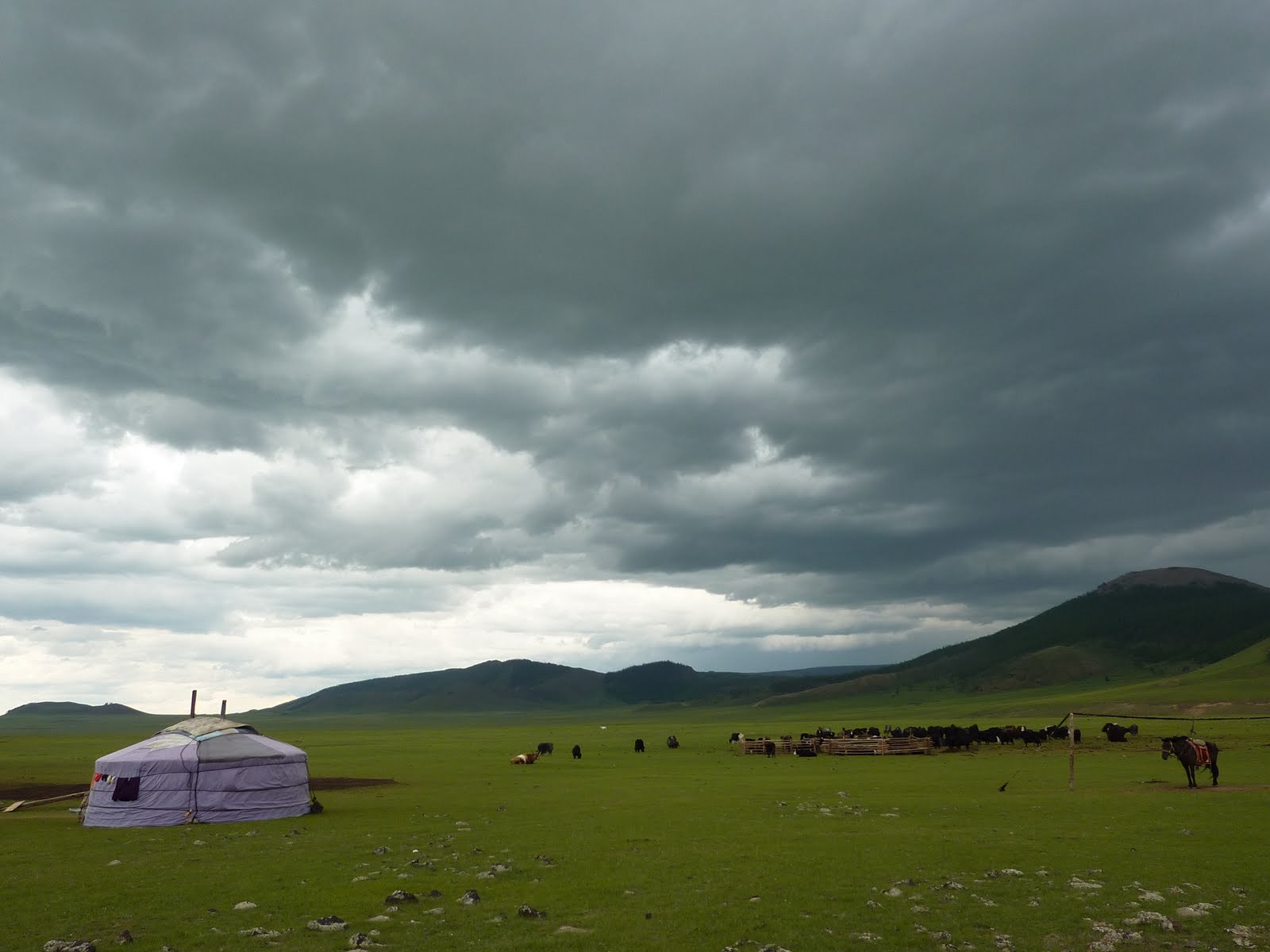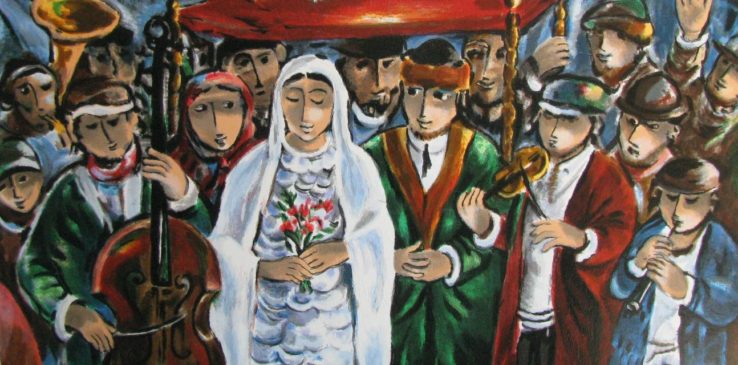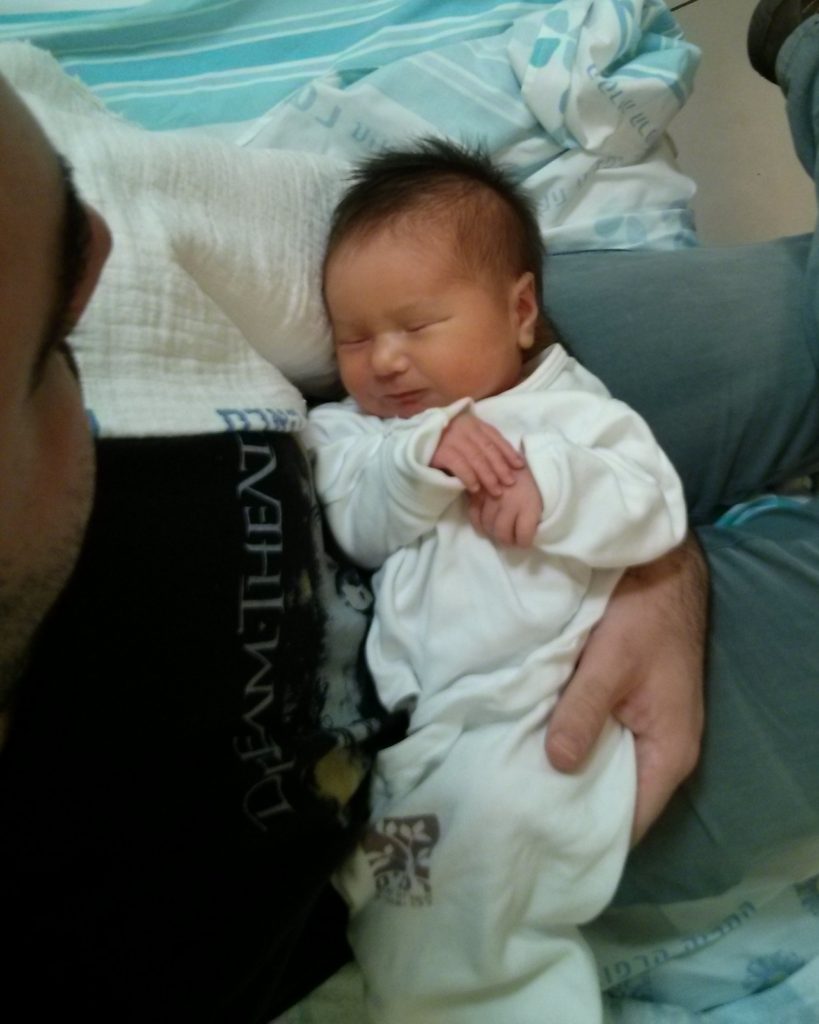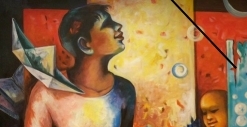My wife and I have lived most of our lives 6,000 kilometers away from each other. Our meeting, unlikely as it was, has led to a close friendship which turned into a marriage. We are what you may call an interracial couple – I’m Ashkenazi Jewish and Oxanna is Buryat-Mongolian. But while many interracial couples have to cope with cultural differences, for us it isn’t the case. We share the same lingual and cultural Russian background and hold the same Western-liberal values.
A mixed-race marriage may not be a big deal in places like Toronto or London, but it’s unusual in Israel. Fortunately we have never met any hostility or discrimination, but Oxanna gets her share of curious glances and unwelcome questions (“Are you from China? How come you speak Russian?”), and I do get some worried voices from acquaintances and good-wishers. Some have suggested that Oxanna should go through giur – a complicated religious ritual that converts non-Jews to Judaism. You see, in Jewish tradition a child is considered Jewish only if his mother is Jewish. And ensuring your children will be Jewish is something most Jewish people in Israel, even among the secular majority, believe strongly about.
Jews have resisted assimilation and integration within the general population, among others by marrying exclusively Jewish spouses. That’s what kept the Jewish heritage alive for centuries during which Jewish people were scattered throughout Europe, North Africa, and the Middle East. But once the Jewish state was founded in 1948, one would think that keeping a Jewish identity by marrying inside your tribe would gradually give away to an Israeli nationhood where this would be ensured by public education, shared culture, and language. But so far this hasn’t been the case. For most Jews in Israel, marrying inside your tribe is still a matter of importance.
When a nation is so hung-up on the idea that you should marry “your own kind”, it shouldn’t be surprising that it would sometimes reveal itself in its ugly extremes, such as with the notorious Lehava organization. This is a group whose proclaimed goal is to preserve the purity of the Jewish nation by “protecting” Jewish women from marrying non-Jews (among others by means of propaganda and disturbing wedding ceremonies). Yes, for Jews to be talking about ethnic purity is incredibly ironic, but apparently no one is protected from ethnic nationalism when they become a majority in their own state. The worrisome issue here isn’t the group itself, which is small and marginal, but the fact that while Israelis do not agree with its methods, many sympathize with its goals.
That’s why it’s important for me, as someone who has traveled to the other side, to set the record straight.
Escaping Ethnocentrism
Most Jewish people believe strongly in the exceptional role of Jews in the world, whether from a historical-cultural perspective (Judaism as a precursor of Christianity and Islam and the exceptional contribution of Jews to science, philosophy and arts) or a religious one (God’s chosen people). Many Jews carry a strong sense of pride associated with their belonging to the Jewish people. In Israel, where it’s reinforced by the society, this pride is even stronger. A pride that often leads to the notion that other cultures aren’t as potent and significant as the Jewish culture. And I certainly wasn’t an exception.
But something changed in me when I was traveling the vast prairies of Mongolia with Oxanna. I saw a land of boundless nature, mostly untouched by industrialization. A land whose harsh climate doesn’t lend itself to agriculture and whose people often still lead a nomadic lifestyle. But despite an apparent absence of a rich cultural heritage in the form of architecture, literature and arts, a land whose people are remarkably proud of their history.

Genghis Khan, whom Mongols regard as the founding father of Mongolia, united disparate tribes and lead them to conquer and establish the largest land empire in the history of humanity, reaching from Korea to Ukraine. Far from being evil and bloodthirsty as he was often portrayed, he abolished torture, embraced religious freedom and advanced the rights of women in Mongol society. He was also the first to connect Asia, Middle-East and Europe and allow people, ideas and trade to flow between them in the first ever wave of globalization.
Mongolian and Buryat history isn’t without its share of tragedy and suffering as well. During Stalin purges tens of thousands of buddhist monks were killed, buddhist temples destroyed, intelligentsia imprisoned. Under the Russian/Soviet imperial colonialism the Mongolian and Buryat heritage were undermined, history rewritten, the Buryat language suppressed.
Getting to know Oxanna and her friends, hearing their family stories, learning about the history and ethnography of this land and it’s people, I couldn’t but feel the center of the world shift in my mind from its firm position in the Jewish continuum to a less ethnocentric one. The more I know about Mongolia and Buryatia – everything, from the world-famous Mongolian throat singing to Baikal lake’s unique ecosystem – a source of pride and spiritual connection for Buryats, the more I realize that every culture evokes pride and stirs up painful memories in its people. And it’s perfectly fine to be proud of your culture and to want to preserve it. But that’s true as long as it doesn’t lead to nationalism, exceptionalism and ethnic seclusion, as is often the case with Jewish people in Israel.
Expanding Your Family
One religious Jewish person whom I respect argued with me why it’s necessary to hold onto your own people:
– “If your ship goes down, whom are you going to save first?”
– “My family of course”, I replied.
– “You see! And we, Jewish people, are all one family and we are all bound to each other”.
– “But my wife and her relatives are also my family now”, I replied. “So I guess I just have a bigger family now”.
Whenever I get the chance to meet Oxanna’s relatives, friends and other people from Buryatia, I feel more than just interest or fascination. I get a real sense of kinship and warmth, normally reserved to “your own people”. My grandmother used to pause for a second, whenever the conversation would turn to mention some prominent Jewish person, and note with significance “you know, he is also our brother”. The same way I sometimes ask Oxanna regarding someone “is she Buryat?”.
The fact that Buryats are an ethnic minority in Russia whose culture and language were suppressed and who get their share of hostility and everyday racism everywhere in Russia outside of Buryatia, is another reason I feel closeness and connection. Russian Jewish diaspora went through a similar ordeal.

It’s easy to romanticize a different culture and assign to it some favorable qualities due to how enigmatic it looks to an outsider. But speaking the same primary language as Oxanna, this is spared from me.
When I look at Oxanna’s childhood pictures with her grandmother, with whom she used to speak Buryat as a child (which she mostly forgot by now), when she tells me how her grandmother used shamanistic rituals to treat her or how her mother took her to a Buddhist monk to get her a Tibetan medicine, when she tells me about Buryat families’ duty towards all the children in the extended family and about her mother supporting four orphaned nephews apart from raising her own two daughters, I not only understand something about Oxanna and her family. I also understand something about myself. And in a very real sense I feel enriched in a way that isn’t available to my Jewish friends with kosher Jewish families.
Curing Your Tribal Anxiety
Not so long ago the Israeli government has run a campaign that tried to persuade Israelis living in the U.S. to return to Israel. In one of the ads we see a small kid greeting his Israeli father happily and calling him ‘dad’. Father’s face says it all: he is upset that his child prefers English ‘dad’ to a Hebrew ‘aba’. Thus, the ad concludes, only by returning to Israel, your children can retain the Hebrew language and the Israeli-Jewish culture. The campaign has been highly criticized for its manipulative emotional rhetoric but never the less it accurately expressed the worries of many Israelis considering moving abroad. Namely, what will happen to their children’s cultural connection to Israel and Judaism? Are they destined to become “typical” Americans or Canadians and lose their Jewish identity?
There is nothing new about this anxiety – children’s Jewishness has always been one of things Jewish people worried most about. All people want their children to carry on their culture, but for Jewish people who carry the memory of their ancestors’ suffering on an almost genetic level, surviving as a nation has been a paramount value throughout the ages.

I used to have similar worries. When my relationship with Oxanna was becoming serious I suddenly started to think about my grandparents. I started to wonder whether I somehow betray them by choosing a partner who isn’t Jewish. Being the first generation who grew up in the Soviet Union, they have lost the religious connection to Judaism, but their Jewish identity and ethnic consciousness lived on. They went on to marry only Jewish spouses, and give birth to Jewish children – my parents. Despite losing Yiddish and any connection to Jewish traditions, my parents went on to marry Jewish spouses as well, and raised me believing I should do the same. So was I justified in breaking this tribal chain that they and their ancestors cared to foster for so long? And wouldn’t our future children be doomed to a life without a clear identity and belonging?
And than I remembered all the Jewish women I ever dated. Despite our supposedly shared cultural and ethnic identity, with none of them I felt a spiritual or emotional connection as strong as with Oxanna. None of them understood my aspirations, worries and doubts better than Oxanna. And for none of them I felt a respect and admiration as I did for Oxanna’s wisdom and courage. Apparently ancestor’s approval doesn’t make you happy. A real person makes you happy. A shared tribal and cultural past surely mean something, but I realized I prefer a shared future of two people who experience each other from the core of their beings, using their own judgement and freedom rather than age-old biases and half-conscious collective conformism.
Understanding Yourself
The fact that I’m married to a non-Jewish woman doesn’t make me less Jewish, just as Oxanna isn’t less Buryat because of it. It’s quite the opposite, actually. The fact that we are able to see ourselves through each other’s eyes gives us a valuable perspective on where we come from.
Oxanna’s mother always encouraged her to travel, leave the nest, and see the world. Right after finishing school, when all of her classmates were enrolling in colleges or marrying, Oxanna traveled to India. We often laugh that Oxanna is a true nomad, always ready to pack her bags and go, wherever her life leads her to. My parents on the contrary have always invested all of their energy and resources into paying for, renovating and maintaining their home, both in their previous life in the Soviet Union, and in Israel. Their need for a safe nest is a typical attribute of a Jewish immigrant psyche. My attachment to my parents is also a typical Jewish-Israeli thing. When Oxanna came to Israel to be with me, she had a minor cultural shock when she found out that we have to visit my parents every weekend. When her mother was alive, Oxanna could go on for a month or two without calling her. Not because they were distant (they actually had a tender relationship) but because calling or visiting frequently just wasn’t something that was expected or required.
The difference in our upbringing gives us a perspective and insight into ourselves that we would otherwise miss.
Setting Your Children Free
The minute the doors of the operating room opened and I saw the nurse carrying a little, wrapped-up human creature towards me, I realized two things: there is a new person on Earth, and he looks nothing like me. This didn’t prevent me from getting attached to my son within a week. But the fact that his resemblance to me is less noticeable than most children’s to their fathers, has had an unexpected effect on me. It has allowed me to see him as a completely new person, absolutely distinct from me from day one. It’s easy to fall into a trap of viewing your child as your own extension, a new version of yourself that should be molded and modeled after you. But I had the opportunity to realize that he isn’t me, he isn’t like me, he shouldn’t make my choices and he shouldn’t relive my life. Thinking how I want my son to be like me, may have occurred to me before he was born, but not afterwards. Whatever mistakes I’m going to make as a father, my son will have a certain level of protection against unfounded expectations that arise from the illusion of sameness.
As all children, our son will grow up and gradually develop an identity. But what kind of identity will it be? Won’t he be torn between two cultures, never really finding himself in neither? Won’t he become a constant outsider – never accepted as a Jewish due to his Asian looks, never really becoming a Buryat due to his disconnection from Buryatia?
None of us choose the identities and circumstances into which we are born. I didn’t choose to be a Jewish kid in a Soviet industrial city, nor did I choose to be a “Russian” teenager in Israel, after coming here with my parents. But not having a ready-made identity of the majority fit you, doesn’t mean you are hopelessly lost. It simply means you have to construct your own identity, which will be necessarily more complex, but also richer than what the common denominator could ever provide you. It’s certainly easier to grow up knowing you belong with the rest, embracing the majority’s beliefs and perceptions uncritically. For the outsiders, on the other hand, the world is inherently a more nuanced place. But with more complexity and richness at their disposal, they have more freedom to be themselves. And so their identities will not become boxes in which to hide from the world, but instead may become springboards from which to leap forward and meet the world in all its complexity.
***
Only time will tell what the future holds for our family. But one thing is for sure – whoever our son decided to marry, I have one less thing to worry about.




My deep gratitude for this enriching contribution. Thank you very much for your honest and lively writing. Did read it with fullest attention. However, facing such deep, different and yet so close cultural different background must be very enriching to both of you. Looking already now very much forward to come and visit you one day. With joy 🙂
Occasionally when driving to a gig in the south of England I see some horses grazing by the roadside and a couple of traditional caravans – it is a joyous sight. The strange hostility of the English towards travellers of all kinds must be a form of envy – many of us cooped up in urban semis in consumerland become bitter and stunted and often isolated. And such a psychological state leads to insecurity, intolerance and xenophobia…perhaps being an island country doesn’t help…and Israel, I guess, must also be susceptible to an island mentality with understandable reason. But you get it everywhere, of course. Your excellent piece put me in mind of a bohemian, free-thinking friend of mine who has made a very successful marriage to a Mongolian woman. Kind wishes, Nick
Hi Sandra,
You are absolutely right, having a partner who is from a far-away land is an enriching experience. I now have friends and know people whom I would never have met otherwise. And I can see the world from a different perspective, which is a priceless thing really 🙂
Hi Nick,
I think that in case of Israel, being an island (politically if not geographically) certainly doesn’t contribute to attitude of diversity and accepting others. But the biggest issue here is still a sense of victim-hood. Jewish people in Israel still feel as a persecuted minority, despite being a secure majority in a regionally powerful country. And as such, we feel we have to keep together in order to survive, just as the Jews have always done when being scattered around Europe. I can only hope that with time this instinctual trauma-related “shrinking” and “closing up” will dissolve and make place for greater openness and tolerance.
Thank you for your comment, I was glad to hear from you 🙂
What do you think – what is the differens between the concepts “people” (народ) and “nation” (нация)? May be it is a begin?
Mike, just got to read you article. I agree, in our times there is no need for “nations” anymore! This word is just hollow and empty of meaning, especially when someone tries to convince you to choose one nation over another.
Volodya,
in this post I guess I use these terms interchangeably.
This is what Wikipedia says about “people”: “A people is a plurality of persons considered as a whole, as in an ethnic group or nation. Collectively, for example, Jews are known as “the Jewish people”, European Gypsies comprise the bulk of “the Romani people”, and Palestinians are called “the Palestinian people”.
And this is Wikipedia about “nation”: “Nation has various meanings, and the meaning has changed over time.The concept of “nation” is related to “ethnic community” or ethnie. An ethnic community often has a myth of origins, and descent, a common history, elements of distinctive culture, a common territorial association, and sense of group solidarity. A nation is, by comparison, much more impersonal, abstract, and overtly political than an ethnic group. It is a cultural-political community that has become conscious of its coherence, unity, and particular interests”.
So I guess the main difference between the two terms, is that people is usually an ethnic group, while nation is a cultural-political group.
Jenya,
I guess belonging of any kind can be enriching and meaningful, but can also become something that limits and holds us back. I’m actually not against people being proud of their belonging to this or that group, as long as they are open and accepting of others.
Wow, Mike. Beautiful article. I’m so glad I found your website. You write wonderfully! My fiancee is Russian Jewish and I’m Asian-American. So I guess it’s pretty cool to meet a “similar” couple (: I haven’t met any so far. Unfortunately, I am not from the same linguistic or cultural background as him, but I’ve been learning Russian and really getting into the culture. It’s super neat. I’ve been worried about what would happen if we ever have children, and reading your post about your own son made all that go away.
Hi Jennifer,
Thank you so much for your comment, it really made my day 🙂
I’m very glad to hear that this post helped you a bit. Our son is 2 years old already and any worry I may have had when he was born waned off. He has such a vibrant and outgoing personality, that it’s hard to see how his mixed origin will ever be a problem for him.
When our partner comes from a very different background, I think it has the potential to make our world so much bigger and richer – discovering places and people you didn’t even realize existed. And not just discovering them – learning to understand them and care about them. This is something that “regular” couples don’t get to experience. So what is the latest thing that you learned about your fiance’s culture, that surprised you?
Have a great day,
Mike
Great Article Mike, I’m not Jewish neither Asian, but I liked your article for the openness and the courage you had to get your own unic story far from the destructing believes and anxiousness making today’s conflicts. I just wanted to comment one one thing (if you do not mind) : Despite Israeli States wanted to prove that Judaism is a chosen race, I tend to correct the fact that Judaism is a religion and has nothing to do with races, so on is the Christianity and Islam, and your story might confirm it – as your sun is mixed race but still can embrace Judaism as a religion since He’s growing in Israel (or with a Jewish grandparents).
Sorry Mike, I realised many typo mistakes after the post wen on – I type w/o correction
Dear Mike,
I came across your blog just now and I gotta say you really deserve the most, utmost respect as a human being 🙂 You are spot on with everything you have written and I couldn’t agree more. Unfortunately I came to realize that not a lot of people will not see the same as you and I do. I also am not a fan of tribalism or sticking with your “own kind”. In certain cases it’s fine since some people who are not very exposed to different surroundings/people..etc may feel comfortable being with people who are like them and what their are familiar with, but I have observed that it can lead to strong prejudices and racism towards other races and cultures (aka us vs them mentality), as a result of the building up strong pride and nationalism for your own country. This leads to lack of tolerance and acceptance and people at times will shit on your for the most stupidest reasons. While being proud of your culture/heritage isn’t bad and should be encouraged at certain times, it’s not cool to look down on other people who are different or pity people who may have origins of your culture but do not fit the mold (must be a certain way, speak the language, or marry a specific person) I have this experience myself among many people I have encountered and the uncalled for judgement/criticism does make your blood boil.
Also ditto with the ‘identity’ concept. Some people I have encountered and also have read on various blogs claim about being “confused” of who they are because they feel they don’t belong anywhere by exactly fitting a certain mold. I always question why be confused. You are right that people are the ability to construct their own identity and can adopt anything they have seen or observed in their lifetime through traveling..etc. I guess many don’t realize that.
It’s nice to see there’s someone out there with similar thinking. I just don’t feel there are so many with this mindset out there. But to each their own.
Hi,
thank you for the comment. Tribal mentality comes very natural to us – that’s how we evolved after all. But some countries have been successful in lessening their pull by building a multicultural society. But many still reinforce the tribal ethos instead of breaking with it.
Cheers,
Mike